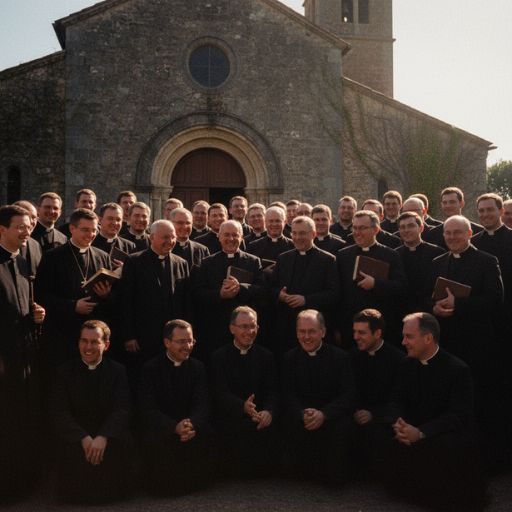I’d heard the rumors all week—the mayor was planning to tear the church down to make space for some luxury apartments.
People whispered about petitions, about protests, but I never expected what I saw that morning.
Over fifty priests. All dressed in black, lined shoulder to shoulder, blocking the church entrance. Some held books, some held rosaries, some just clasped their hands tight like they were bracing for a fight.
The mayor’s men showed up with papers, threats, cameras rolling. The air was heavy, charged, like something was about to break.
And then, one of the priests stepped forward. His beard was white, his eyes steady, and his voice cut through the shouting like a bell. “You will not pass,” he said. No drama, no yelling. Just calm, clear defiance.
The men with the papers laughed at first. One of them waved the documents in the air like they were shields. “We’ve got the mayor’s approval. This place is condemned. You can’t stop progress.”
But the priests didn’t move. Not an inch. It was like trying to push against a mountain. And then the crowd started gathering. First a handful of locals, then dozens, then hundreds. Some clapped, some shouted, some just stood there filming on their phones.
I was among them, clutching my jacket tighter, not even sure why I couldn’t walk away. Something about the sight of those priests—so many of them, together—felt like history was happening right there.
A young mother stepped out of the crowd, holding her child. “This church baptized my son,” she said loudly. “You can’t just erase it.”
Others joined in. An old man with a cane raised his voice about how his parents were married there. A teenager shouted that his grandfather’s funeral had been held in that very church. Every voice added to the weight pressing down on the mayor’s men.
They looked uneasy now. Their threats didn’t land as strong. They whispered among themselves, probably calling for backup.
That’s when the mayor himself arrived. Black car, tinted windows, the kind of entrance that makes people part like water. He stepped out, slick suit, forced smile, acting like he wasn’t walking into a storm.
“Friends,” he began, voice smooth like he was at a campaign rally, “we must look to the future. This old building is falling apart. Apartments will bring jobs, money, growth. Isn’t that what this town needs?”
But no one cheered. The silence was sharp, cutting. Then Father Andrei, the old priest who had spoken first, shook his head slowly. “What we need,” he said, “is roots. You cannot build a future if you destroy the ground beneath it.”
